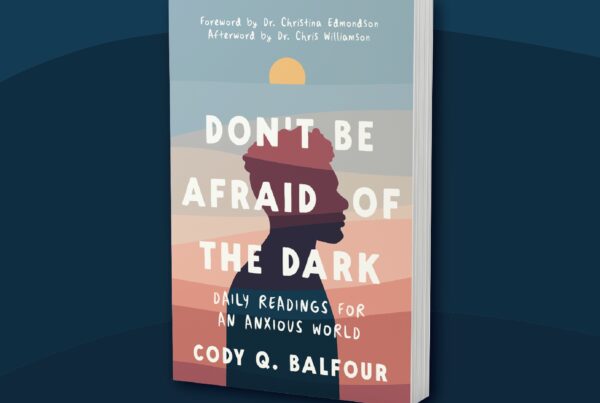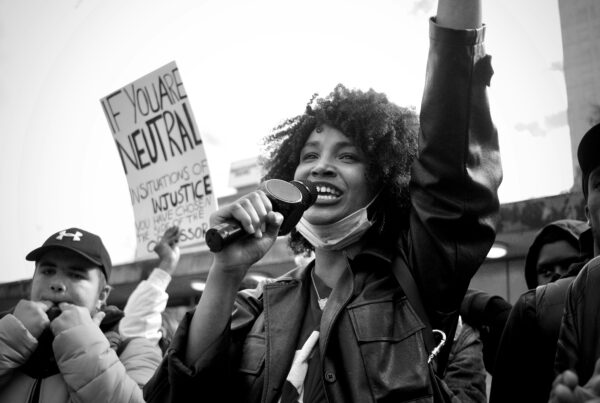“Their spirit of resilience runs through our veins, and like them, we know goodness is our birthright.”
In “The Women We’ve Been Waiting For ” Tiffany Bluhm writes of the countless BIPOC women who have come before us. Women like Rahab, who pushed for survival in the midst of oppression and trauma.
Their commitment to take care of themselves and others is an embodiment of goodness.
In this devotional Tiffany Bluhm and 11 other women writers help us to follow in the footsteps of women like Rahab, so that we can become the type of people that our communities need.
We are honored to share an excerpt from “The Women We’ve Been Waiting For: A 40-Day Devotional for Self Care, Resilience and Communal Flourishing,” below:
“May God himself, the God who makes everything holy and whole, make you holy and whole, put you together— spirit, soul, and body— and keep you fit for the coming of our Master, Jesus Christ. The One who called you is completely dependable.” —1 Thessalonians 5:23 (Message)
In an age when girl-boss meritocracy and White feminism are glorified at the expense of all women flourishing, we have much to learn from the thread of communal renewal weaved through the stories of our minority sisters in history.
These image bearers who’ve gone before us demanded civil and human rights when the status quo failed to address their needs. They cast aside a system not built for them and challenged the norms— and in some cases downright evil— of their time and place.
Countless Black, Indigenous, and Women of Color, as well as those with disabilities, bear a lineage stained by oppression, racism, sexism, othering, and traumas of the very worst kind. Yet our matriarchs and mothers, aunties and abuelas, ammas and ommas embodied goodness and tenacity in their honest quest for survival. So do we.
Their spirit of resilience runs through our veins, and like them, we know goodness is our birthright. The One who makes everything holy and whole makes us holy and whole, and in turn, we push for wholeness in our world.
Perhaps the matriarchs with complicated backstories have the most for us to glean from, as their very lives were often on the line as they navigated the difficulties that came their way.
In Joshua 2, before the Israelites colonized Jericho, Joshua sent two spies to scope out the land. These spies found protection in the unlikely form of a woman called Rahab. Engaged in the oldest profession and the head of her household, Rahab shrewdly made a deal with the Israelite spies to spare herself and her family in exchange for her aid. Additionally, she prophesied, as Deborah did before her, the Israelites’ victory over Canaanite territory.
Rahab’s unique geolocation on the outskirts of the city, reserved for the lowborn and outcasts, positioned her perfectly to aid the Israelite spies. As someone with a disreputable occupation and no way to rise above her station, she brokered this deal that brought safety and security for herself and her extended family in a time and place when few things could.
Her belief in the God of Israel led her to risk everything with this treasonous act, and when Israel conquered Jericho, her female- led household was grafted into the new sociopolitical order of Israel. A Canaanite woman engaged in prostitution (a triple deficit) is the fearless mouthpiece of what’s to come for Israel and is a matriarch named in the lineage of Jesus (Matt. 1:5). Her actions were motivated not by meritocracy or a lick of girl- boss energy but by a fierce commitment to care for herself and her family in a place that did not.
Rahab’s account teaches us that our approach to renewal first begins with identifying our nonnegotiable values, what we will and won’t tolerate. That’s selfcare. Arguably, self- care equips us for social change. When I refer to self- care, I’m not referring to the $1.5 trillion industry that hawks bubble baths and yoga retreats marketed to us by capitalistic machines who wish to profit from our perceived deficiencies. Rather, it’s looking out for ourselves in a world that does not.
Author Julia Lee’s description of self- care hits the nail on the head. She says that it’s “treating yourself as human in a world that dehumanizes you.” Self- care is living as worthy of respect and rest simply because you exist and not because you’ve accomplished something extraordinary to deserve such an existence.
Women’s health psychiatrist Dr. Pooja Lakshmin says that selfcare is a verb, a commitment to live by your guiding principles in your everyday decision- making. It’s proactive rather than reactive. Self- care is inherently subjective, and we’d be wise to allow others to grow in their own time and place as they consider their history, culture, and wounds.
Self care for social change is developed when we build healthy boundaries, hold paradoxes, consider what we believe, and evolve in our becoming for the betterment of ourselves and others.
Within our commitment to follow the Creator is a measure of self- denial, but this is not at odds with our actualized self-care. These two things work together to forge an embodied life of deep trust in the Divine and wise decision-making that centers the flourishing of our heart, mind, soul, and strength.
If we’re to love our neighbor as ourselves, as Jesus told his followers in Mark 12, the implied command is to care for ourselves. Rahab knew caring for herself meant bucking societal standards and refusing to honor unjust systems.
We aren’t promised everything will bend our way because we take care of ourselves and others, and we’ll likely never be in a position to broker a deal with foreign spies, but the woman we become along the way—noble and humble, unapologetic and empathetic—that’s the woman the world has been waiting for.
Prayer
God of Rahab, make me holy and whole. Giver of Life, strengthen my spirit, soul, and body.
Declaration
I’m becoming the woman I’ve waited for: noble and humble, unapologetic and empathetic.
Questions to Ponder
• How do you define self- care?
• How can you connect the dots in your own life from self-care to social change?

Tiffany Bluhm is a speaker and writer with more than fifteen years of experience in ministry and nonprofit leadership. She is the author of Never Alone, She Dreams, and Prey Tell and former cohost of the Why Tho? podcast. She speaks at conferences, companies, and churches around the world, and her work has been featured in Publishers Weekly and Sojourners. As a minority, immigrant woman with an interracial family, Bluhm is passionate about inviting all to the table of faith, equality, justice, and dignity. She lives in the Pacific Northwest.
The views and opinions expressed on the Chasing Justice Blog are those of the authors and do not necessarily reflect the official policy or position of Chasing Justice. Any content provided by our bloggers or authors are of their opinion and are not intended to malign any religion, ethnic group, club, organization, company, individual or anyone or anything.







